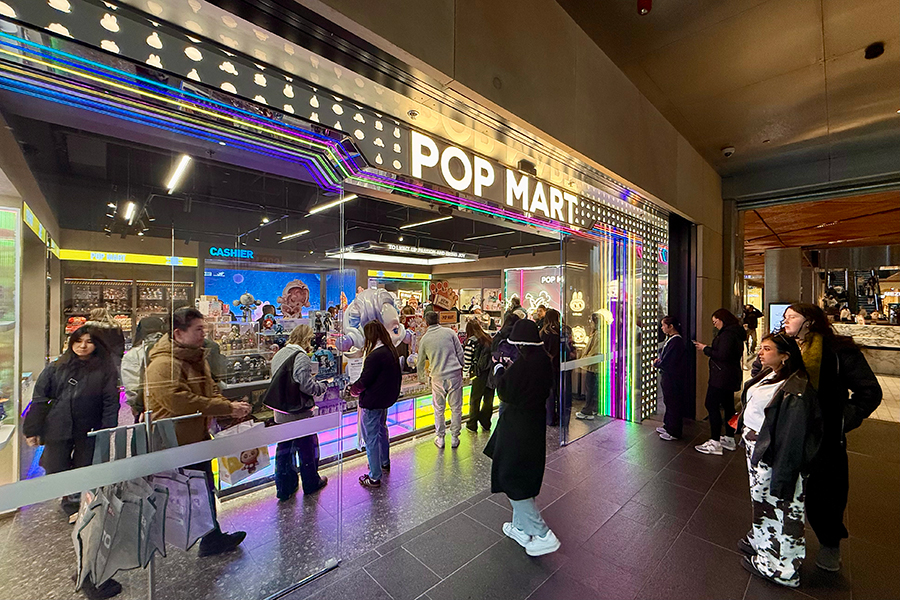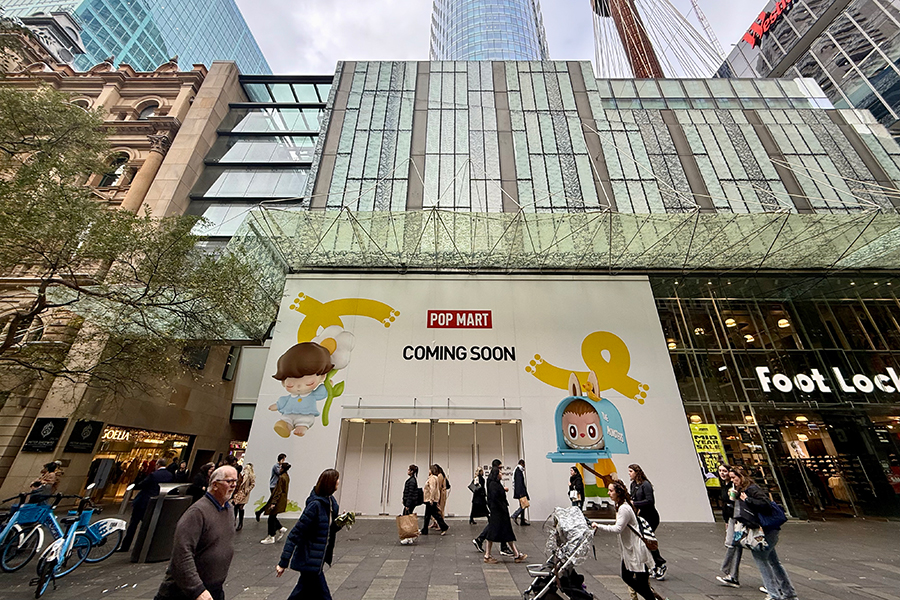Labubu fever sweeps Australia
Quirky plushies from China's Pop Mart sell like hot cakes in major cities, with blind boxes adding to the appeal


Australian consumers are helping fuel frenzy for a Chinese company's plush collectibles, with young and old forming long lines at stores for the toys in major cities.
The small "Labubu" furry dolls, featuring quirky monster characters, from Chinese toy retailer Pop Mart are drawing huge crowds, including many adult shoppers, to stores in Sydney, Melbourne and Brisbane.
Sydney resident Rita Leong, an enthusiast of collectibles, said the recent popularity of the dolls can be attributed to its appealing design, proving that Chinese designer toys offer collectible value. Labubu taps into collectors' desire for unique items with its rarity value and appeal, she said.
"In the past, Chinese products in the designer toy market were often seen as having 'no real limits' in terms of supply, whereas Western brands — like sneakers and streetwear — have always been able to capture the interest of collectors," Leong told China Daily.
"This is the first time I've seen people lining up in Sydney to get their hands on Chinese designer toys."
Leong said she has always enjoyed collecting trendy knick-knacks, and her two children, aged 18 and 21, are also big fans of Labubu.
"Each time we visit a store, we usually spend between A$50 ($33) and A$200. So far, we've probably spent around A$3,000 in total on the toys," she said.
Another key factor behind Labubu's popularity is its use of the blind box format, which creates a "lottery-like" thrill that makes people want to try their luck, Leong said.
"Labubu figures mostly come in blind boxes, and they're not too expensive — ranging from a dozen dollars to a few hundred," she said.

"Some people are now auctioning off the limited editions, but I don't think it's necessary to pay extra for those."
Wei Li, senior lecturer in international business at The University of Sydney Business School, told China Daily the Labubu products are popular because "they have successfully combined psychological stimulation, social interaction, and smart commercial design".
"The excitement of not knowing which character you'll get creates a sense of surprise and uncertainty that's similar to drawing trading cards or playing gacha games," said Li, referring to the games linked to the Japanese gashapon vending machine-dispensed capsule toys.
"These toys also have a strong social aspect, as celebrities and fans trade and showcase rare editions over social media, forming a sense of identity and belonging within collector communities," she said.
"This model, seen in brands like Pop Mart, is similar to what Japan did with Pokemon cards and gashapon. It can be replicated by non-Chinese companies if they create strong original characters, use multiple sales channels (like vending machines, online, physical stores), and build communities around their products."
"It's a formula that combines fun, culture, and commerce — and it works globally," said Li, who researches the globalization of Chinese enterprises.
Pop Mart said in March it had posted a strong performance for 2024, with revenue up 106.9 percent to 13 billion yuan ($1.8 billion) and net profit growing 185.9 percent to 3.4 billion yuan, with growth driven by the plush toy category and overseas market expansion.
"This isn't just about 'toys' but a collectible, pop-culture movement engaging Australian adults like never before," local media portal News.com.au cited a company spokesperson as saying.
Li from the University of Sydney said Labubu is popular "less because it is a toy manufactured in China, but because it is a collectible with stories and emotional value through its intellectual property (IP)".
"Labubu was created by Kasing Lung, a Hong Kong–born artist raised in the Netherlands, as part of his 'The Monsters' series, inspired by Nordic mythology and fairy tales," she noted.

The broad appeal of the toys "reflects a universal consumer interest in storytelling, character design, and emotional connection, rather than any specific cultural characteristic. It appeals not just to children or hobbyists but to young adults and urban creatives who view it as an extension of personal taste, identity, and even home decor", Li said.
"Earlier collectible crazes — like Pokemon cards, action figures, or model cars — were historically male-dominated, often centered around competition, combat themes, or technological appeal. By contrast, Labubu and Pop Mart's designer toys appeal across genders, with a particularly strong fan base among young women. The character has a distinct personality and emotional narrative, which gives fans a deeper connection that goes beyond mere collecting — it feels like owning a piece of an evolving story."
"Also, rather than traditional advertising, social media platforms like Instagram, Xiaohongshu and TikTok have played a huge role in driving Labubu's organic fan engagement," she said.
"Labubu's success reflects globalized IP storytelling. It was born from a Hong Kong-Dutch artist, inspired by Nordic myths, designed in China, and embraced globally. This pluriversal cultural appeal is different from earlier, often nationally rooted collectibles that didn't translate as easily across borders," Li said.
"Previous collectible crazes often collapsed when supply overwhelmed demand. In the short term, Pop Mart uses blind boxes, limited editions, and hidden variants to create a sense of artificial scarcity. This keeps collectors engaged and sustains repeat purchases," she said.
"In the long term, Labubu's current popularity has the potential to endure if brands evolve creatively, expand IP storytelling, and maintain emotional resonance with collectors. If managed well, it can grow from a moment of hype into a sustainable cultural product category.
"For consumers, businesses, and society, Labubu offers opportunities for creativity and joy. The success of Labubu has fueled growth in the creative IP and design sectors, offering jobs to illustrators, designers, marketers, and manufacturers. It also proves that Chinese brands can lead global pop culture."
At the same time, Li said the "blind box mechanics" may encourage "repetitive buying, which can result in unnecessary spending, excess packaging, and environmental waste".
Sydney resident Leong said that to increase her chances of getting the toys she wants, she has downloaded the official Pop Mart app, set up notifications, and keeps an eye on stocks. That makes it much easier than waiting in long lines outside the store, she said.
"Before this, the only Chinese product I'd seen people line up for in Sydney was Moutai," said Leong, referring to the Chinese liquor.
Contact the writers at xinxin@chinadaily.com.cn
































